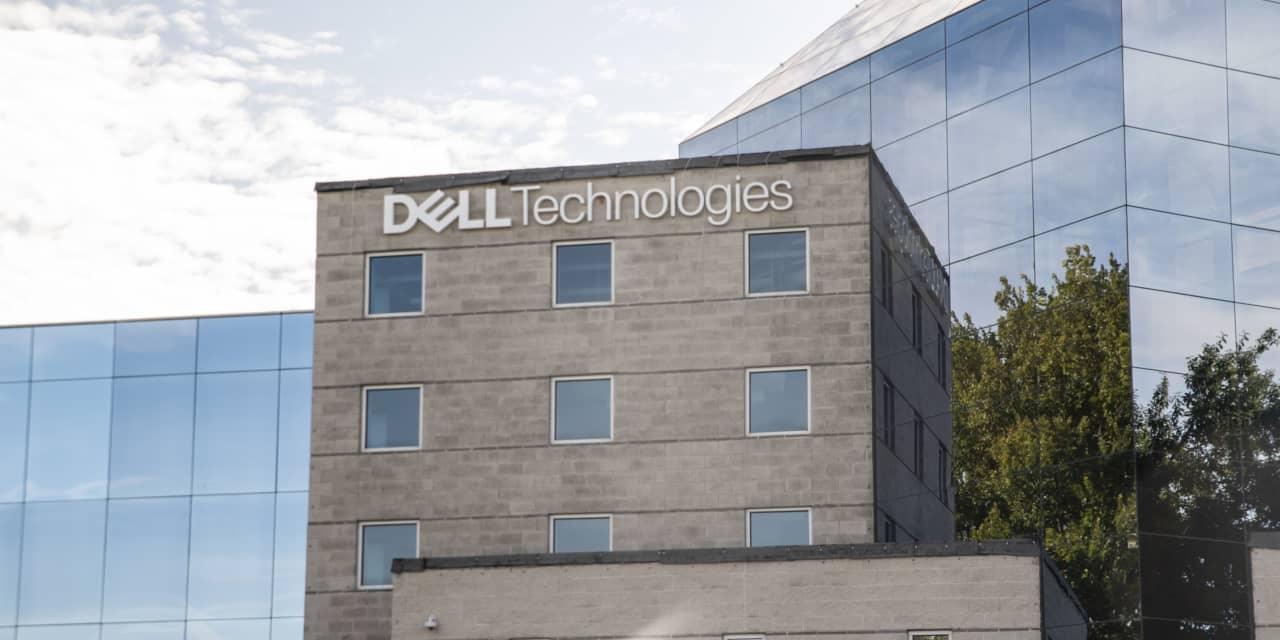Dell
Technologies posted better-than-expected earnings for its latest quarter, as the company continues to see robust demand for AI servers.
Dell shares in late trading were 16% higher at $110.
The maker of PCs also announced a 20% increase in its quarterly dividend rate, and provided strong guidance for fiscal 2025.
For the fiscal fourth quarter ended Feb. 2, Dell posted revenue of $22.3 billion, down 11% from a year earlier. Still, the figure was within the company’s guidance range of $21.5 billion to $22.5 billion, and ahead of the Wall Street consensus as tracked by FactSet of $22.2 billion.
Earnings on an adjusted basis were $2.20 a share, well ahead of the Street consensus at $1.73 a share and the company’s forecast for $1.70 a share. Dell said that about 19 cents of the earnings beat reflected a lower-than-expected tax rate, with the rest reflecting lower operational expenses and revenue slightly above plan.
Dell said its backlog of artificial intelligence servers—most of them powered by
Nvidia
H100 chips—has now reached $2.9 billion, compared with $1.6 billion last quarter and $800 million two quarters ago. Dell has shipped $1.5 billion of AI servers over the last two quarters—and said it has a pipeline of interest in AI servers that is “multiples” of the current backlog.
Dell said it is seeing improving supply of H100 chips from Nvidia, and that there is additional demand for servers from AMD’s pending MI300 chip and for the next generation of Nvidia chips. Dell Vice Chairman and COO Jeff Clarke said in an interview with Barron’s that “demand is well in excess of supply” for AI servers.
Dell said its client solutions group revenue—mostly PCs—was $11.7 billion, down 12% from a year earlier and off 5% sequentially. That is consistent with the softer-than-expected quarter reported on Wednesday from rival HP Inc.
On the topic of PC demand, Dell said large corporate buyers remain “a little bit cautious,” given the current global geopolitical and macroeconomic climate. But the company continues to think that a refresh cycle is coming, as Covid-era laptops age. Dell plans to launch new AI-powered PCs in the second half of the year, but expects adoptions to roll out over multiple quarters.
Clarke said that by the end of fiscal 2025, he expects one out of every five PCs sold to be AI capable. He thinks that total could double by the end of fiscal 2026.
Dell said its infrastructure solutions group—which includes enterprise servers, storage, and networking gear—had revenue of $9.3 billion in the period, well above the Street consensus forecast at $9 billion. While revenue declined 6% from a year ago, it was up 10% sequentially. The company had projected sequential growth would be in the mid-single digits in percentage terms.
Dell’s new quarterly dividend rate is 44.5 cents. The first payment at that rate will be May 3, to holders of record April 23. The stock now has a yield of about 1.9%.
For the April quarter, the company sees revenue of between $21 billion and $22 billion, up 3% at the midpoint, which would be slightly above consensus at $21.4 billion. Non-GAAP EPS is expected to be $1.15 a share, below consensus at $1.40. The company said gross margin will be sequentially lower given a “seasonally lower storage mix and a higher AI optimized server mix.”
Dell CFO Yvonne McGill told Barron’s the softer per-share earnings forecast reflects a combination of increasing semiconductor component costs and a more competitive pricing environment. She notes the company has a policy of keeping parts inventory low, which helps in a deflationary environment—but can bite when prices start to rise.
For the January 2025 fiscal year, Dell sees revenue of $93 billion, up 5%, and slightly ahead of the Street consensus at $92.2 billion, with midteens growth in infrastructure solutions, and low-single-digits growth for the client solutions group. The company expect profit on an adjusted basis of $7.50 a share, above the Street at $7.14.
McGill noted the company sees growth from infrastructure and client solutions combined of 8%. The offset is tied to the runoff of maintenance revenue tied to the winding down of the company’s relationship with VMware, which was acquired by
Broadcom
in late 2023.
Write to Eric J. Savitz at [email protected]
Read the full article here




